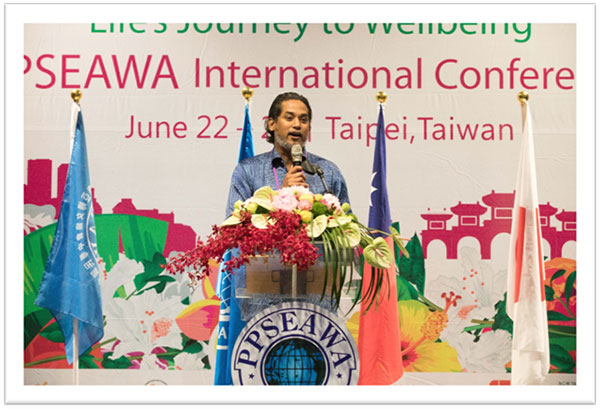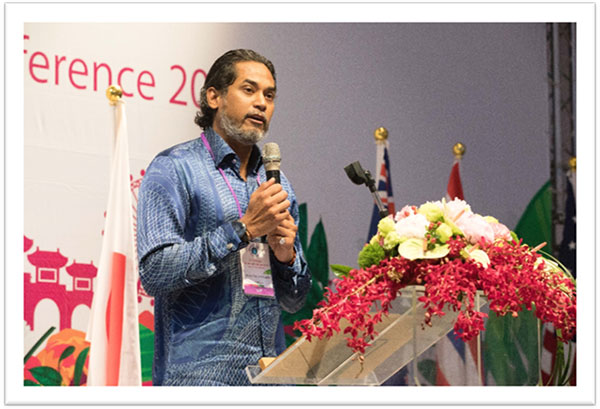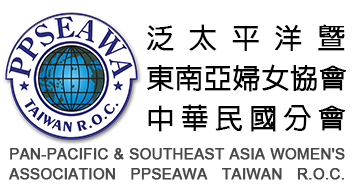
女性應如何幫助拯救世界?
What women have to once again do to save the world?
Speech by Khairy Jamaluddin
PPSEAWA international conference 2019
Date: June 23, 2019
自PPSEAWA於1928年成立以來,人類面臨著許多生存威脅,在成立一年之後,世界,尤其是西方,經歷了巨大的經濟蕭條,這種情況在幾年後間接導致了全球戰爭的爆發,這又導致了可怕的核對峙,除了武力衝突,飢荒、貧困、嬰兒死亡率、疾病則是真正造成數百萬人喪生的問題。

今天我們回顧過去,並了解到我們已經走了很遠,雖然內戰、種族滅絕和恐怖攻擊仍然存在,但與PPSEAWA成立時相比,戰爭威脅已在全球範圍內減弱,經濟和社會指標也是如此,儘管根據2030可持續發展目標(SDGs),國際社會仍然專注於減輕貧困、減少經濟不平等、改善弱勢族群獲得醫療保健、營養、衛生和教育的機會,但過去幾十年全球景氣已有所提升。
科技使我們能夠治癒疾病、提高工作效率、快速傳播知識、加強世界各地的合作,對於那些今天出生的人來說,他們將在一個物理、數字和生物領域將更加交織的世界中成長,人工智能、機器人、合成生物學和量子計算改變了我們的生活方式。
然而,這並不是說當今人類沒有生存威脅,我們知道全球戰爭的幽靈可能不存在,但我們真的能免受武裝衝突的影響嗎?我之前提到內戰、種族滅絕和恐怖攻擊仍然威脅到部分的人類,極端主義政治的崛起如果不受到挑戰和遏制,很容易陷入身體暴力,世界上有許多地緣政治不穩定的地區不僅沒有得到解決,而且還受到超級大國競爭的影響。
經濟不平等仍然是一個巨大的挑戰,2017至2018年間,每兩天就會產生一位新的億萬富翁,然而世界上幾乎有一半的人每天生活費不到5.50美元。
1928年PPSEAWA成立時,人們將戰爭、飢荒和貧困視為存在的威脅。今天,我們面臨著自己的威脅:全球氣候危機,如果我們不改變今天的生活方式,我們的孩子就不會有明天,就這麼簡單。
當我在馬來西亞政府擔任部長時,我被要求通過研究未來30年將發生的重大變化,透過盡可能地預測,來前瞻我們的國家(使我們國家不過時),我們希望制定公共政策和資金,以緩解這些變化對我們人民的影響。
我們預見到的一些變化是:2035年高齡化社會、長壽和社會保護、都市化、保護自然資源、未來就業和工業4.0、新威脅(如網絡、假新聞),上述這些絕不是詳盡無遺的。希望現在的政府可以做好未來計劃,不僅僅是為了現在這一代的未來,同時也為下一代做好準備。重要的是永遠都要記得我們今天所做的事情將由後代來承擔,如果我們耗盡自然資源並繼續燃燒地球,他們將受到影響;反之,如果我們可持續地保護和發展,他們將獲益。正如PPSEAWA的創始目標之一「辨別當今婦女和兒童的需求和問題」,而我想加入「明天的(未來的)婦女和兒童」來補充這一點。現在,我們比以往任何時候都更需要能夠展望未來,並為那些追隨我們的人保護未來。
這引出了我最後的意見。
PPSEAWA的成立是為了加強和平與友誼,這是由聯合國承認的,由女性所完成的優秀且跨國的運動的中心思想。希望婦女能夠通過家庭塑造世界,特別是通過向子女傳授正確的價值觀,作為PPSEAWA的孩子,我非常感謝,無論我生命中取得多大的成就,主要是因為我母親教給我的,她是一位自豪的PPSEAWA姐妹。
但今天對我們所有人來說都是挑戰,隨著技術的快速變化,人類面臨著歷史上最大的身份危機,人工智能不再局限於科幻小說領域,機器人從事越來越多地人類過去的工作,孩子們正在沉迷於他們的小玩意兒,我們可能有比以前更多的朋友,但這些是我們從未見過的朋友,他們是Facebook的朋友,我們在社交媒體上閱讀並相信未經證實的消息。在這種世界裡,我們也變得不安全,再加上貧富差距和經濟不平等、跨國移民、民粹主義和極端主義政治,我們成為了說出我們恐懼的領導者的人質。
我們捫心自問:在這個動蕩的數字世界中,人類意味著甚麼?人類還有任何作用和效用嗎?當政治變得有毒時,我們如何促進和平與友誼?
我認為使我們成為獨特人類的價值觀的價值仍然存在,這是人工智能和機器人無法完全理解或複製,我們的孩子們必須培養打擊仇恨、容忍、消除偏見所需的價值觀。對他們來說,擁有學術嚴謹或職業技能非常重要,但機器人可以並且很快就能做到,而這些價值觀將提醒我們人類是什麼。
首先是「同理心」,同理心說起來容易做起來難,我們或許能夠認真地思考,把自己置於另一個人的角度,但我們是否能夠充滿熱情地行動,特別是如果它沒有給我們帶來任何好處呢?然而,同理心也許是糾正長期存在的錯誤所需要的最重要的品質,讓每個人都能夠實現他們上帝賦予的潛力,並與仇恨的有毒政治作鬥爭。
第二個是與同理心有關—「同情心」。演算法無法學習人類同情的深度,機器人可能有一天能夠通過對我們進行心臟直視手術來滿足您的生理需求,但他們是否可以照顧我們的心理健康?在我們變老,需要社會保障的同時,社會將需要富有同情心的政府。
接下來是「合作」。機器可以互相交談,但他們真的在互相交談嗎?人類合作帶來了最偉大、長久的和平與繁榮的時代,然而,今天我們看到了對這個偉大的全球契約的威脅: 戰爭正在進行中、各國希望孤立並單獨行動、邊界正在建立以防止合法移民、各國正逐漸擺脫以規則為基礎的國際體系。我們能扭轉這個局面嗎? 我們看到世界各地的年輕人如何在網上聚集起來應對氣候危機,這是鼓舞人心的,因為他們發現若沒有合作和集體發聲,他們的未來正在被剝奪。
第四是「想像力」。人類的聰明才智可以為今天和明天的問題提供解決方案,政府無法解決所有問題,市場也不可能。科技是沒有道德觀念的,這既不好也不壞, 重要的是它的使用方式,我們必須確保我們使用新技術的想像力是解決問題,而不是增加問題。
最後,我們需要「反思」。無論是宗教祈禱、哲學思想還是安靜的冥想,我們都需要花時間思考我們的個人和人類的生存狀態,電腦無法反映,大多數政治家和首席執行官也沒有,這就是經常做出錯誤決定的原因,結果是產生一些短期的、民粹主義的、不誠實的、自私的決定。如果我們能夠經常花一點時間來構思我們的想法並重新定位我們的行動,我相信我們會更好地解決我今晚談到的一些問題。
以上,來自PPSEAWA兒子的一些關於女性為了拯救世界而再次做些什麼的想法。中國諺語說:「女性能頂半邊天」。我認為你們撐起一半以上的天空,你們晃動搖籃的手就是統治世界的手,我希望你們在2028年的百週年紀念之前,以你們的智慧和同情心繼續震撼全世界。
Since PPSEAWAʼs founding in 1928 humankind has confronted many existential threats. Only a
year after PPSEAWAʼs birth, the world, especially the West, experienced a tremendous economic depression. That indirectly led some years later to the outbreak of a global war which in turn led to a terrifying nuclear stalemate. Other than armed conflict, famine, poverty, infant mortality, disease were real problems that cost millions of lives.
Today we look back and realise how far we have come. While there continues to be civil wars, genocide and terrorist attacks, on a global scale the threat of war has diminished compared to when PPSEAWA was formed. So too economic and social indicators. Although the international community is still focused on alleviating poverty, reducing economic inequality, improving access to healthcare, nutrition, sanitation and education to the most vulnerable as per SDG 2030, global prosperity has increased over the last few decades.
Technology has enabled us to cure diseases, make work more efficient, disseminate knowledge faster, increase cooperation around the world. For those born today, they will grow up in a world where the physical, digital and biological spheres will intertwine even more as artificial intelligence, robotics, synthetic biology and quantum computing change the way we live.
Yet, this is not to say there are no existential threats to humankind today. The specter of global war may not exist as we know it, but are we truly immune from armed conflict? I mentioned earlier civil wars, genocides and terrorist attacks that still threaten parts of humanity. The rise of extremist politics can easily descend to physical violence if not challenged and contained. There are many geopolitical flashpoints around the world that not only remain unresolved but are subject to the influence of superpower rivalries.
Economic inequality remains a big challenge. A new billionaire was created every two days between 2017 and 2018. Yet, almost half of the world lives on less than USD5.50 a day.
In 1928 when PPSEAWA was founded, people thought of war, famine and poverty as their existential threats. Today, we face a threat of our own doing: the global climate crisis. If we do not change the way we live today, there will not be a tomorrow for our children to live. Its as simple as that.
When I was a minister in the Malaysian government I was asked to future-proof our country by looking at the big changes that would take place over the next 30 years. By forecasting and anticipating as much as possible, we wanted to put in place public policy and the funds to cushion the impact of these changes on our people.
Some of the changes that we foresaw are: an aging society by 2035, longevity and social protection, urbanisation, safeguarding natural resouces, jobs of the future and IR4.0, new threats (cyber, fake news). This is by no means exhaustive. The hope is that present governments can plan for the future, not just for the present generation that will be aging but also for future generations. It is important to always be cognisant that what we do today will be borne by future generations. If we deplete natural resources and continue to burn the planet, they will suffer. If we conserve, preserve and develop sustainably, they will reap the benefits. Just as one of PPSEAWAʼs founding goals is “Identifying the needs and problems of todayʼs women and children,” I would like to add to this by including ‘tomorrowʼs women and childrenʼ. Now, more than ever, we need to be able to look far into the future and safeguard that future for those that come after us.

This brings me to my final observation.
PPSEAWA was founded to strengthen peace and friendship. And this was done with women at the centre of this wonderful, multinational movement that is recognised by the United Nations. It was hoped that women could shape the world through their families, especially by imparting the right values to their children. As a child of PPSEAWA, I thank you. Whatever small achievement I have in my life is mostly due to what my mother has taught me. And she is a proud PPSEAWA sister.
But here is the challenge for all of us today. With rapid changes especially in technology, humans are confronted with perhaps the biggest crisis of identity in history. Artificial intelligence is no longer confined to the realms of science fiction. Robots are increasingly doing jobs that humans used to do. Children are becoming addicted to their gadgets. We may have more friends than before, but these are friends that we have never met. They are Facebook friends. We read and believe unverified messages on social media. In this kind of world, we also become insecure. Combine this with wealth disparity and economic inequality, transnational migration, populist and extremist politics, we become hostages to leaders who speak to our fears.
This requires us to ask ourselves: what does it mean to be human in this volatile, digital world. Will humans still have any role and utility? How do we promote peace and friendship when politics has become toxic?
I think there are still values that make us uniquely human, that artificial intelligence and robots cannot fully understand or replicate. Values that are needed to combat hatred, intolerance and prejudice. And these values more than anything have to be nurtured in our children. Yes, it is important for them to have academic rigour or vocational skills, but those the robot can and will do soon. But these values will remind us of what it is to be human.
The first is empathy. Empathy is easier said than done. We may be able to think empathetically, putting ourself hypothetically in another personʼs shoes but can we act empathetically especially if it does not bring us any benefit? And yet, empathy is perhaps the most important quality that is needed to right long-standing wrongs, to allow everyone to fulfill their God-given potential and to fight the toxic politics of hate.
The second is related to empathy. And that is compassion. Algorithms cannot possibly learn the full depths of human compassion. Robots may be able to one day attend to your physiological needs by performing open heart surgery on us but can they attend to our mental health? Societies will need governments that are compassionate as we become older, in need of social security.
Next is cooperation. Machines can talk to one another, but do they really TALK to one another? Human collaboration has resulted in the greatest, prolonged era of peace and prosperity. Yet, today we see threats to this great global compact. Wars are being fought in trade, countries want to isolate and go it alone, borders are being erected preventing legitimate migration, countries are slowly moving away from a global, rules-based international system. Can we reverse this? We see how young people around the world are getting together online to fight the climate crisis. This is inspiring because they see that without collaboration and their collective voice, we are robbing them of their future.
Fourth is imagination. Human ingenuity can provide solutions to today and tomorrowʼs problems. Governments cannot solve everything. Neither can the markets. Technology is amoral. It is neither good nor bad. Its how it is used that is important. We must ensure that our imagination of using new technologies are directed towards solving our problems and not adding to them.
And finally, we need reflection. Whether this is religious prayer, philosophical thought or quiet meditation, we need to take time and reflect on our personal state of being and that of humankind. Computers cannot reflect. Most politicians and CEOs donʼt either. Thatʼs why the wrong kinds of decisions are often made. Short-term, populist, dishonest, self-interested decisions are the result. If we are able to regularly take a little time to compose our thoughts and redirect our action, I believe we will be in a better position to address some of the problems I have spoken about tonight.
So there it is. Some thoughts from a PPSEAWA son about what women have to once again do to save the world. The Chinese proverb says, Nv sing neng ding ban bian tian. Women uphold half the sky. I think you uphold more than half of the sky. The hand that rocks the cradle is the hand that rules the world. I hope you will all continue to rock the world with your wisdom and compassion right up to and beyond your centenary in 2028.
